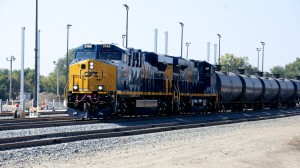Railroads agree to slow down crude oil trains in major cities

NAT HAMILTON/WHYY NEWS
A CSX unit train delivers a load of crude oil from the Bakken Shale in North Dakota to a refinery in South Philadelphia.
Federal regulators and American railroads have agreed to voluntary changes that could make shipping crude oil by rail safer, including slowing down trains in major cities by at least 10 miles per hour.
Under the agreement between the U.S. Department of Transportation and the Association of American Railroads, operators will also inspect tracks more frequently and pay to boost emergency planning along their routes. Federal regulators say these voluntary changes are paving the way for more regulation since a dramatic increase in rail traffic hauling domestic crude oil has resulted in more accidents on tracks across the country – including Pennsylvania.
“Safety is our top priority, and we have a shared responsibility to make sure crude oil is transported safely from origin to destination,” U.S. Transportation Secretary Anthony Foxx said in a statement to the Associated Press.
“It does seem pretty obvious that one should look at the problem in all its aspects,” says Phil Rinaldi, CEO of Philadelphia Energy Solutions.
The refinery in South Philadelphia takes in at least two loads of crude oil every day on trains stretching more than 100 cars long. Last month, a train bound for the refinery derailed, leaving seven cars intact, but leaning across a bridge spanning the Schuyllkill River and a major highway.
Crude-by-rail is helping to keep Philadelphia in the oil refining business – an industry that was on its way out in 2011 – but Rinaldi admits there is room for improvement.
“We think that we’re taking prudent risk and maybe this is a little bit of a learning as we go along, but railroads have been pulling cargo for just too many years to believe that they can’t do that safely,” he says.
Environmental advocates, however, are not satisfied. Iris Marie Bloom with Protecting Our Waters, a Philadelphia-based group, says the agreement does not address one major risk: old tanker cars that are prone to puncture during derailments.
“The DOT-111 cars should be taken off the tracks now,” Bloom says. “We know too much about how vulnerable they are.”
Federal regulators and the railroads say they are working on that issue separately.
“I’m glad that they’re slowing speeds and increasing track inspections,” Bloom says. “But these are policies that should have already been in place.”
The industry’s voluntary changes are expected to take effect by July.
















